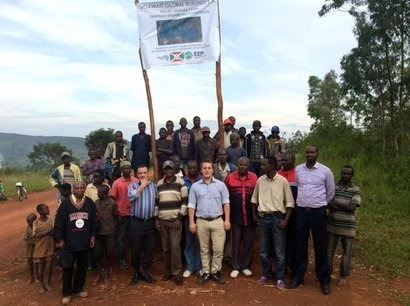
Gigawatt Global (GWG) is a partner of Power Africa and the Power Africa Beyond the Grid sub-initiative. It has now signed two international grants for a solar project in Burundi, a 7.5 MW solar field that will increase the country’s generation capacity by 15 percent. This in turn follows the company’s successful launch last month of East Africa’s largest utility-scale solar field, which added 6 percent to Rwanda’s electricity generation capacity and for which it was nominated the 2015 Nobel Peace Prize.
The project in Burundi is being supported by two grants totalling nearly $1 million, from Power Africa via the US Trade and Development Agency (USTDA) and the Energy and Environment Partnership (EEP), a coalition representing the British, Finnish, and Austrian governments. The solar field will be constructed on a 15-hectare site in the Gitega region, 65 miles from the capital of Bujumbura. It will generate enough electricity to supply 60,000 households and will cost around $20 million to develop.
“Our impact investment model is to strengthen developing nations, both economically and environmentally, by providing renewable energy sources where they are most needed” said Yosef Abramowitz, President of GWG. “We plan to build 1,000 solar megawatts in Africa by 2020, thereby providing electricity to millions of households and institutions that are currently without the most basic of human needs.”
The USTDA grant will fund a feasibility study that will address key technical and economic aspects of the solar project, conduct environmental and social impact assessments and provide the necessary analysis for the project to secure financing. The grant funds awarded by EEP will be used for pre-development works and legal costs.
“I welcome the completion and launch of an 8.5 MW solar installation in Rwanda by Gigawatt Global” said US Secretary of State John Kerry. “This is the first utility-scale solar project to come online under the US-Africa Clean Energy Finance (ACEF) programme, which is now an integral part of Power Africa. The project expands electricity generation capacity by more than 6 percent in a country where more than 80 percent of the people live without access to electricity, and is providing enough grid-connected power to supply 15,000 homes.”
Kerry added that with continually decreasing costs, minimal maintenance and no fuel costs, renewable energy makes more sense now than ever before, especially in remote settings. He said that projects such as Gigawatt Global’s, with the support of the US Department of State, the Overseas Private Investment Corporation (OPIC), and the U.S. Trade and Development Agency through ACEF, underscore that the best path to energy access and economic development is also the sustainable path of clean energy.
Burundi currently experiences a high frequency of blackouts, with downtime in electrical access an average of two days a week. The country has a total installed electrical capacity of only 52 MW which includes 15.5 MW of diesel-generated power. The Government of Burundi has signed a Memorandum of Understanding (MOU) with GWG for the development of the project which will create full time project maintenance jobs, part-time construction work and jobs from support contracts with local businesses. Additionally, GWG is working with the Polytechnic University of Gitega, international NGO’s, and the local community to develop a Corporate Social Responsibility program to enhance knowledge transfer and support community development.
For additional information:

